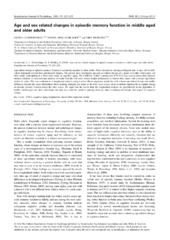Age and sex related changes in episodic memory function in middle aged and older adults
Peer reviewed, Journal article
Published version
Permanent lenke
https://hdl.handle.net/1956/8982Utgivelsesdato
2014-03-06Metadata
Vis full innførselSamlinger
Originalversjon
https://doi.org/10.1111/sjop.12114Sammendrag
Age-related change in episodic memory function is commonly reported in older adults. When detected on neuropsychological tests, it may still be difficult to distinguish normal from pathological changes. The present study investigates age-and sex-related changes in a group of healthy middle-aged and older adults, participating in a three-wave study on cognitive aging. The California Verbal Learning test (CVLT-II) was used to assess their episodic memory function. A cross-sectional analysis of results from the first wave showed higher performance in females than males, with a steeper age-related decline in males. This was confirmed in a longitudinal analysis using a mixed effects regression model, but with a lower age-related change and smaller difference between the sexes. Information about learning strategies and errors in the third wave turned out to contribute significantly to explain change in episodic memory function across the three waves. We argue that the results from the longitudinal analyses are generalizable to the population of healthy middle-aged and older individuals, and that they could be useful in guiding clinicians when evaluating individuals with respect to cognitive change.
Utgiver
WileyScandinavian Psychological Associations

